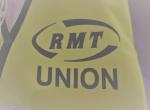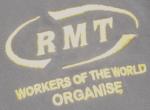What is a National Executive Committee decision?
This article is an 'executive decision' which has been written by the RMT National Executive Committee. The National Executive is the union's governing body in between AGMs. Its decisions set out what the union will do on a particular issue.
These decisions can often be brief, and may be one of several passed over a period of time. To get a better understanding or find out more information about what the RMT is doing, speak to your rep or attend your branch or Regional Council meeting.
Similar topics:
RMT's General Grades Committee today took a detailed decision about our continuing fight against London Underground job cuts. The full decision is below. In summary:
- We oppose LU plans for two trials of new ticketing procedures.
- We are exposing the extent to which LU's planned staffing cuts will leave stations completely unstaffed for periods during the day.
- We will call a 48-hour strike, with dispute payments to strikers; this will take place later in January, with dates named after consultation with TSSA.
- We will ensure that there is plenty of communication with members about the talks and about the action, and efforts to win public support and promote our case.
=====
The full decision:
That we note that London Underground’s plan to trial ‘Enhanced AFM Functionality’ will see many Customer Service Assistants carrying out functions from outside the ticket office that are currently carried out by the higher-paid grade of Station Assistant Multi-Functional from inside the ticket office. This is extra workload for CSAs and makes them vulnerable; it is also a further step in the company’s strategy of closing ticket offices and cutting station staff. Further, we note London Underground plans to trial an ‘Automated Oyster Helpline’, which will threaten the jobs of our members in the Oyster Contact Centre and may well make it harder for our members in ticket offices to get the support they need when dealing with Oyster problems. We further note that the employer has not properly consulted with this union about these trials. We instruct the General Secretary to ensure that RMT representatives firmly oppose these moves; to publicise our views to members and more widely; and to consult with our representatives about what other action may be taken, including the possibility of boycotting these trials.
We note the report from our Stations & Revenue Council showing the extent of stations being unstaffed should the proposed job cuts take place. This illustrates the devastating effect that these cuts would have, leaving stations with no-one to deal with operational tasks and incidents and leaving passengers without assistance. We also note that, as shown in the report, London Underground management have consistently lied about this, having made several public statements that no stations will be left unstaffed. We instruct the General Secretary to publicise this information as widely as possible, using it to underline our determination to fight against the destaffing of stations.
We agree with the resolution of our LU Engineering branch (and several other branches which have submitted similar resolutions) that we need to increase the pressure on London Underground to withdraw its job cuts. We therefore agree to call strike action for 48 continuous hours over three weekdays in January. We will liaise with TSSA with the aim of ensuring that this action is taken jointly by our two unions and to agree appropriate dates. We instruct the General Secretary to place this matter back before us at the GGC meeting on Tuesday 11 January.
We note the previous decision of the Council of Executives (CEWW 21/12/10) that dispute payments will be made to members. We instruct the General Secretary to convene an urgent meeting of the Council of Executives to discuss the details of the implementation of this decision.
We further instruct the General Secretary to:
- Once strike action is called, send a personal letter by post to all members involved, informing them of this decision and the reasons behind it
- Liaise with our Regional Council to ensure that material is produced and circulated to members – leaflets and newsletters, emails, texts, etc., addressing their concerns and questions.
- Arrange for officers, representatives and branch officials to visit as many workplaces as possible to promote the action.
- Ensure that members are kept informed of progress in talks.
- Send a letter by post to all representatives (industrial relations and health & safety) explaining the talks process in detail and their role in it, as well as their role in building for effective industrial action.
- Jointly with the TSSA, produce leaflets for the public explaining our case.
- Maximise press coverage of the union’s stance and challenge unfair and inaccurate reporting.
What is a National Executive Committee decision?
This article is an 'executive decision' which has been written by the RMT National Executive Committee. The National Executive is the union's governing body in between AGMs. Its decisions set out what the union will do on a particular issue.
These decisions can often be brief, and may be one of several passed over a period of time. To get a better understanding or find out more information about what the RMT is doing, speak to your rep or attend your branch or Regional Council meeting.
- 2385 reads






